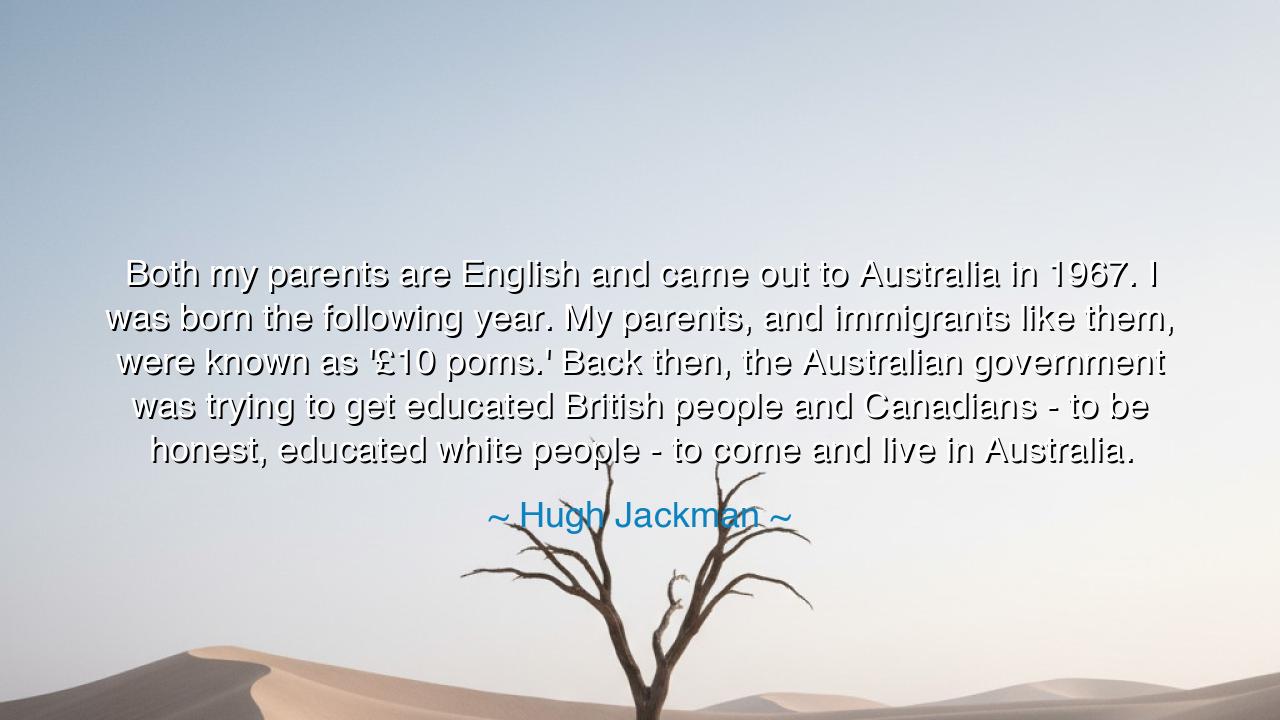
Both my parents are English and came out to Australia in 1967. I
Both my parents are English and came out to Australia in 1967. I was born the following year. My parents, and immigrants like them, were known as '£10 poms.' Back then, the Australian government was trying to get educated British people and Canadians - to be honest, educated white people - to come and live in Australia.






In the soft glow of remembrance, when men and women look back upon the journeys that shaped nations, the actor Hugh Jackman spoke words that echo with both gratitude and honesty:
"Both my parents are English and came out to Australia in 1967. I was born the following year. My parents, and immigrants like them, were known as '£10 poms.' Back then, the Australian government was trying to get educated British people and Canadians — to be honest, educated white people — to come and live in Australia."
In this reflection, Jackman unveils a tale that is both personal and historical — a story not merely of migration, but of identity, opportunity, and the uneven road by which nations are made. The ‘£10 pom’ scheme, launched by the Australian government after the Second World War, offered British citizens passage to a new land for only ten pounds sterling. It was a time when Australia sought to build its population, its economy, and its future — yet in doing so, it revealed the deep complexities of belonging and the subtle hierarchies of race and privilege that marked the age. Jackman’s words remind us that every story of migration carries both light and shadow: the dream of a better life, and the unspoken questions of who is welcomed — and who is not.
The meaning of his statement lies not only in family history but in the nature of nations themselves. Every country is built upon the courage of those who leave one shore for another, who plant roots in unfamiliar soil and call it home. The £10 poms were part of this great movement — ordinary families who sought adventure and prosperity in a young and growing land. For many, it was a journey from the cold gray skies of postwar Britain to the blazing sun of the Southern Hemisphere, from uncertainty to promise. Yet Jackman, in his humility, reminds us that this opportunity was not granted equally. The gates were open, yes — but open only to “educated white people.” His words bring forth the eternal truth that progress, when built upon exclusion, carries a quiet injustice within its triumph.
The origin of this policy was born from both hope and fear. In the aftermath of World War II, Australia stood vast and underpopulated, fearful of invasion and desperate for growth. Its leaders declared a vision of “populate or perish,” seeking millions of new settlers to secure its borders and strengthen its economy. But rather than open its arms to all peoples, the government favored those from Britain — to preserve what it called its “British character.” Thus began the great wave of assisted migration, where thousands of families crossed oceans for the price of ten pounds, enticed by the promise of land, work, and sunshine. It was a policy of nation-building, yes — but one also woven with the threads of the White Australia Policy, which sought to maintain a homogenous, European identity in a land already ancient and diverse.
History records the triumphs and sorrows of those who came. Many £10 poms arrived with dreams as vast as the country itself. Some found fortune and belonging; others faced hardship and homesickness. For all their labor, they helped transform Australia — building its cities, its industries, its schools, and its sense of national self. Yet their story coexisted with another — the story of the First Nations peoples, whose voices were long silenced in the telling of the nation’s growth. The soil upon which new settlers walked was already sacred, already claimed by history far older than the British crown. Jackman’s words, spoken with the clarity of hindsight, remind us that progress untempered by awareness risks forgetting the truths it stands upon.
There is a deep humility in the way Jackman names the truth — “educated white people” — a phrase that exposes both privilege and policy. It is not bitterness he speaks with, but honesty, and in that honesty lies wisdom. For no generation is without its blindness; no nation is without its contradictions. Yet only by acknowledging them can healing and understanding begin. The Australia that welcomed his parents was striving for greatness — and it has grown far beyond the narrow ideals of its past. Through voices like his, that past is neither condemned nor concealed, but studied, understood, and redeemed by the light of truth.
From this reflection arises a universal lesson. The movement of people — migration — is one of humanity’s oldest acts of courage. But it must always be guided by justice, by the recognition of every person’s equal worth. Governments may build nations, but it is diversity, labor, and compassion that make those nations thrive. As the world faces new migrations, new walls, and new fears, Jackman’s words remind us that the greatness of a country is not measured by who it keeps out, but by how it welcomes those who seek to join its story.
Thus ends the teaching: remember that every journey of migration is sacred, every exile and arrival a thread in the vast fabric of humanity. Let no nation forget that the hands that build its cities may come from distant shores, and that the strength of a people lies not in sameness, but in shared purpose. As Hugh Jackman’s story shows, the children of migration carry within them the living proof that from many roots, one enduring tree may grow — strong, beautiful, and ever-reaching toward the light.






AAdministratorAdministrator
Welcome, honored guests. Please leave a comment, we will respond soon